Yogita Limaye
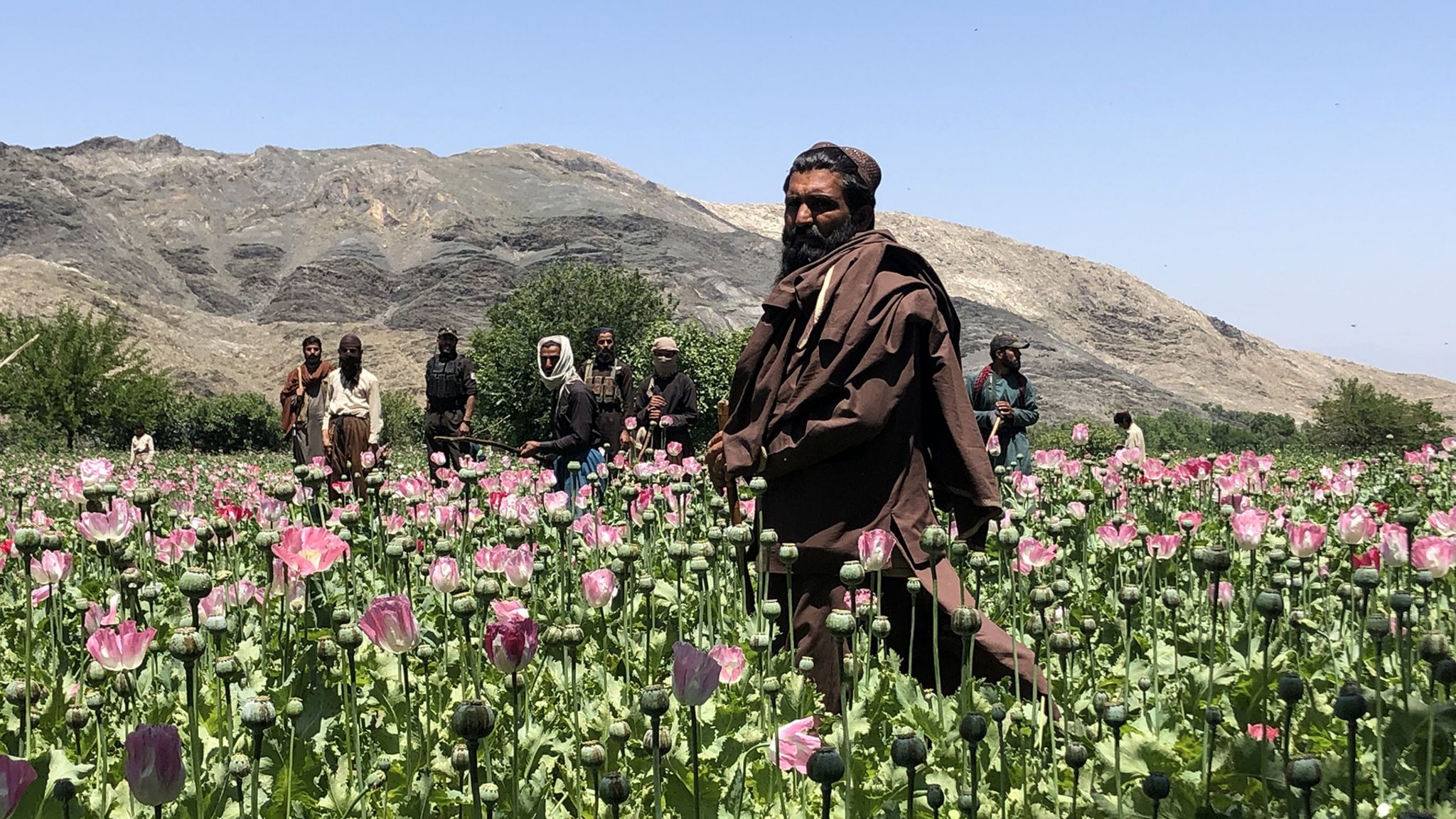
Balancing an AK-47 assault rifle slung around his left shoulder and with a large stick in his right hand, Abdul hits the heads of poppies as hard as he can. The stalks fly in the air, as does the sap from the poppy bulb, releasing the distinctive, pungent smell of opium in its most raw form.
Within a matter of minutes, Abdul and a dozen other men raze the poppy crop which covered the small field. Then the armed men, all wearing a shalwar kameez (a traditional Afghan tunic with loose fitting trousers), most with long beards and some with kohl-lined eyes, pile into the back of a pickup truck and move on to the next farm.
The men belong to a Taliban anti-narcotics unit in the eastern Nangarhar province of Afghanistan, and we've been given rare access to join them on one of their patrols to eradicate poppy farming. Less than two years ago the men were insurgent fighters, part of a war to seize control of the country. Now they've won and are on the ruling side, enforcing the orders of their leader.
In April 2022, Taliban supreme leader Haibatullah Akhundzada decreed that cultivation of the poppy - from which opium, the key ingredient for the drug heroin can be extracted - was strictly prohibited. Anyone violating the ban would have their field destroyed and be penalised according to Sharia law.
A Taliban spokesman told the BBC they imposed the ban because of the harmful effects of opium - which is taken from the poppy seed capsules - and because it goes against their religious beliefs. Afghanistan used to produce more than 80% of the world's opium. Heroin made from Afghan opium makes up 95% of the market in Europe.
The BBC has now travelled in Afghanistan - and used satellite analysis - to examine the effects of the direct action on opium poppy cultivation. The Taliban leaders appear to have been more successful cracking down on cultivation than anyone ever has.
We found a huge fall in poppy growth in major opium-growing provinces, with one expert saying annual cultivation could be 80% down on last year. Less-profitable wheat crops have supplanted poppies in fields - and many farmers saying they are suffering financially.
We travelled to provinces including Nangarhar, Kandahar and Helmand, drove through bumpy, mud roads, walked for miles in remote, mountainous areas, making our way through farmland, leaping across gurgling streams to see the reality on the ground.
Media caption,
Watch: Taliban cut down an opium poppy field
The Taliban decree wasn't applied to the 2022 opium harvest, which according to the United Nations Office on Drugs and Crime (UNODC) increased by a third over 2021.
This year though, is very different. The evidence we saw on the ground is backed up by imagery taken from above.
David Mansfield, a leading expert on Afghanistan's drugs trade, is working with Alcis - a UK firm which specialises in satellite analysis.
"It is likely that cultivation will be less than 20% of what it was in 2022. The scale of the reduction will be unprecedented," he says.
A large number of farmers have complied with the ban, and Taliban fighters have been destroying the crops of those that haven't.
Toor Khan, the commander of the Taliban patrol unit we are with in Nangarhar, tells us he and his men have been destroying poppy fields for nearly five months, and have cleared tens of thousands of hectares of the crop.
"You're destroying my field, God destroy your home," one woman shouts angrily at the Taliban unit as they raze her poppy field.
"I'd told you this morning to destroy it yourself. You didn't, so now I have to," Toor Khan screams back. She retreats indoors.
Her son is detained by the Taliban, released with a warning a few hours later.
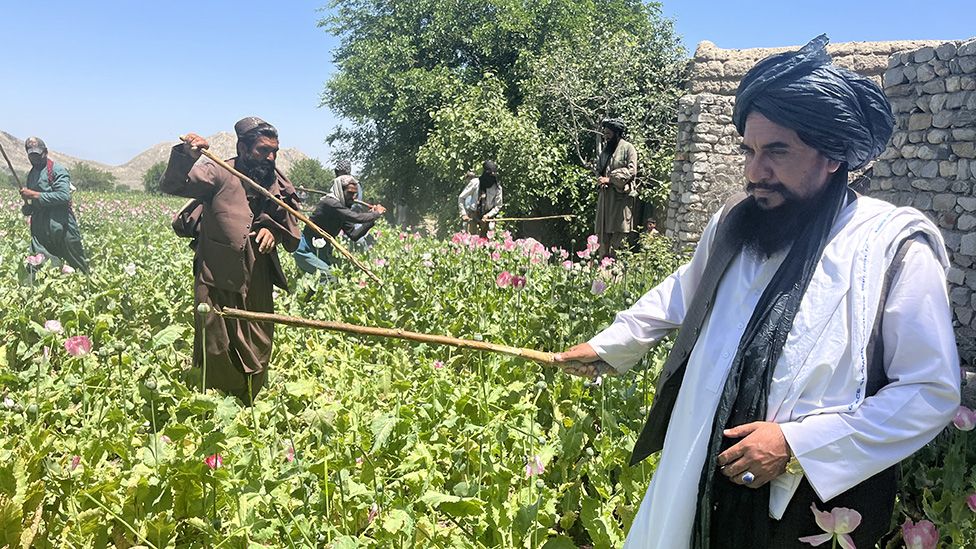 Image caption,
Image caption,Toor Khan (right) razing a poppy field to the ground along with fellow Taliban members
The Taliban go armed and in large numbers, because there have been instances of resistance from angry locals in this area. At least one civilian was killed in a shooting during the eradication campaign and there are reports of other violent clashes.
Farmer Ali Mohammad Mia has a stricken look on his face as he watches the unit destroy his field. Pink poppy flowers, green bulbs and broken stems cover the ground when they are done.
Why did he cultivate poppy despite the ban, we ask.
"If you have no food at home, and your children are going hungry, what else would you do," he says. "We don't have large pieces of land. If we grew wheat on them we would make a fraction of what we could from opium."
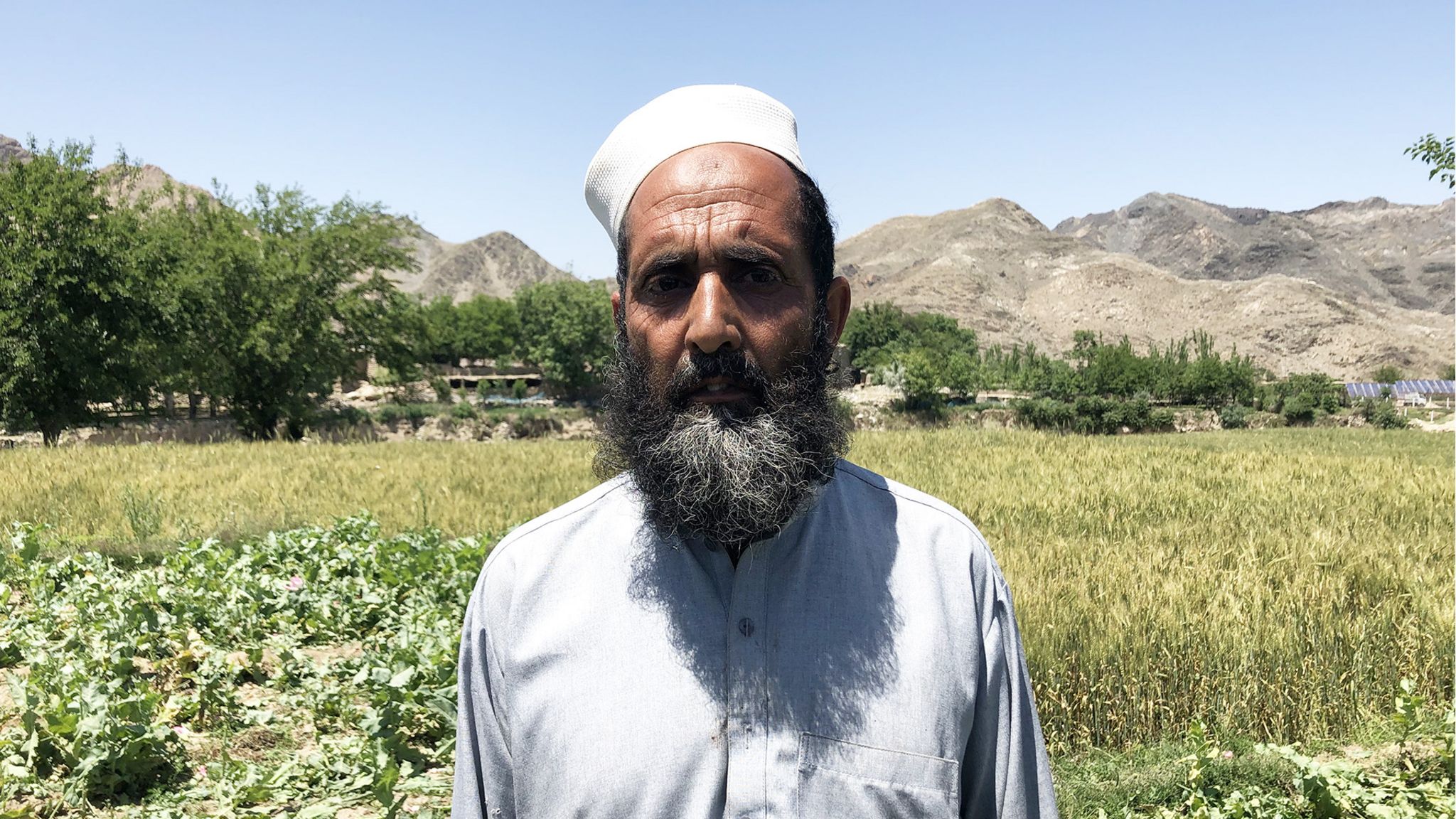 Image caption,
Image caption,The ban on poppy growing forces farmers such as Ali Mohammed Mia to cultivate cheaper crops, like wheat
What is remarkable is the speed at which the Taliban carry out the job using only sticks. Six fields, each between 200-300 sq m in size, are cleared in just over half an hour.
How do they feel about destroying a source of income for their own people who are going hungry, we ask Toor Khan.
"It is the order of our leader. Our allegiance to him is such that if he told my friend to hang me, I would accept it and surrender myself to my friend," he says.
Helmand province in the south-west used to be Afghanistan's opium heartland, producing more than half of the country's opium. We travel there independently of the Taliban's anti-narcotics unit, to see first-hand how it now looks.
Last year when we were in the province, we saw swathes of land covered with poppy fields. This time we can't spot a single field of the crop.
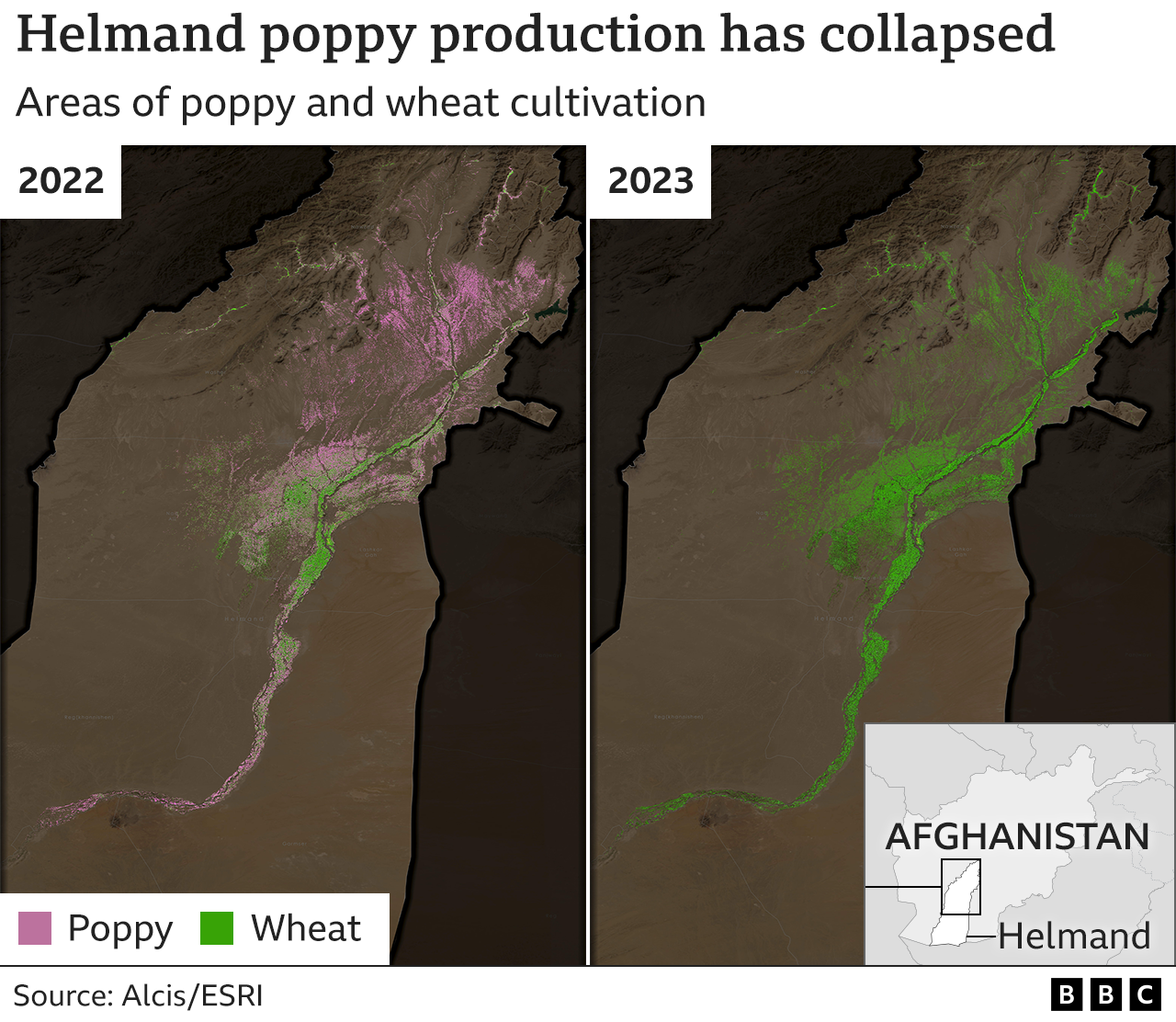
Alcis's analysis shows that poppy cultivation in Helmand has reduced by more than 99%. "The high resolution imagery of Helmand province shows that poppy cultivation is down to less than 1,000 hectares when it was 129,000 hectares the previous year," says David Mansfield.
We meet farmer Niamatullah Dilsoz in the Marjah district - south of Helmand's capital, Lashkar Gah - while he is harvesting wheat. Last year, he grew poppy in the same field. He tells us farmers in Helmand, a Taliban stronghold, have all but complied with the ban.
"A few farmers tried to grow poppy in their courtyards hidden behind walls, but the Taliban found out and destroyed those fields," Niamatullah says.
Except for the sound of wheat stalks being cut and the calls of birds, it is quiet in the farm. During the war, the field was a front line. Helmand was where UK troops had a base and where they fought some of their fiercest battles.
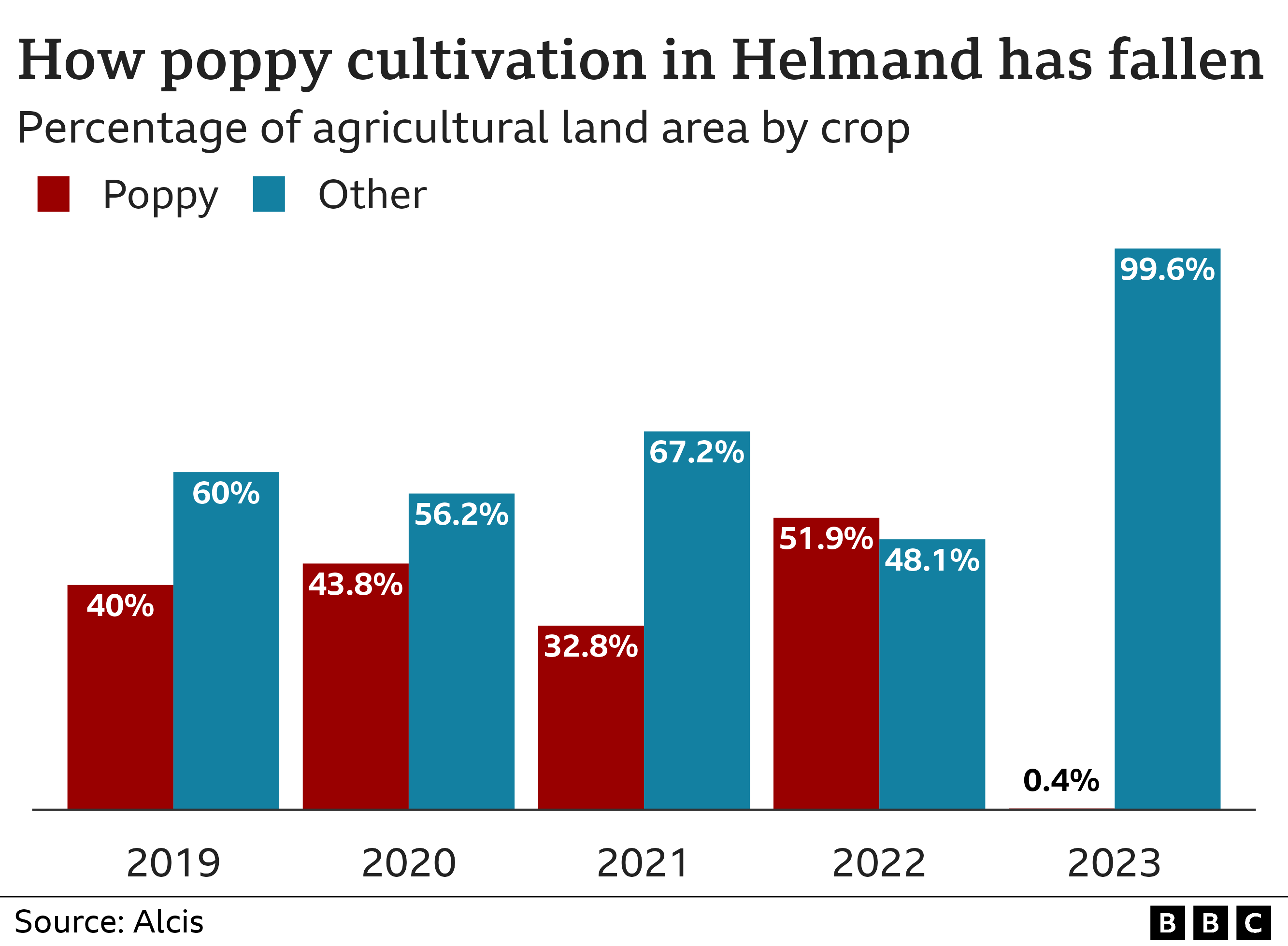
Niamatullah is in his early twenties. This is the first time in his life that he doesn't fear being hit by a bomb when venturing out. But for a people already battered by a long war, the opium ban has struck a crushing blow, coming as it does amid an economic collapse which has caused near universal poverty in Afghanistan. Two thirds of the population don't know where their next meal will come from.
"We are very upset. Wheat earns us less than a quarter of what we used to make from opium," he says. "I can't meet my family's needs. I've had to take a loan. Hunger is at its peak and we haven't got any help from the government."
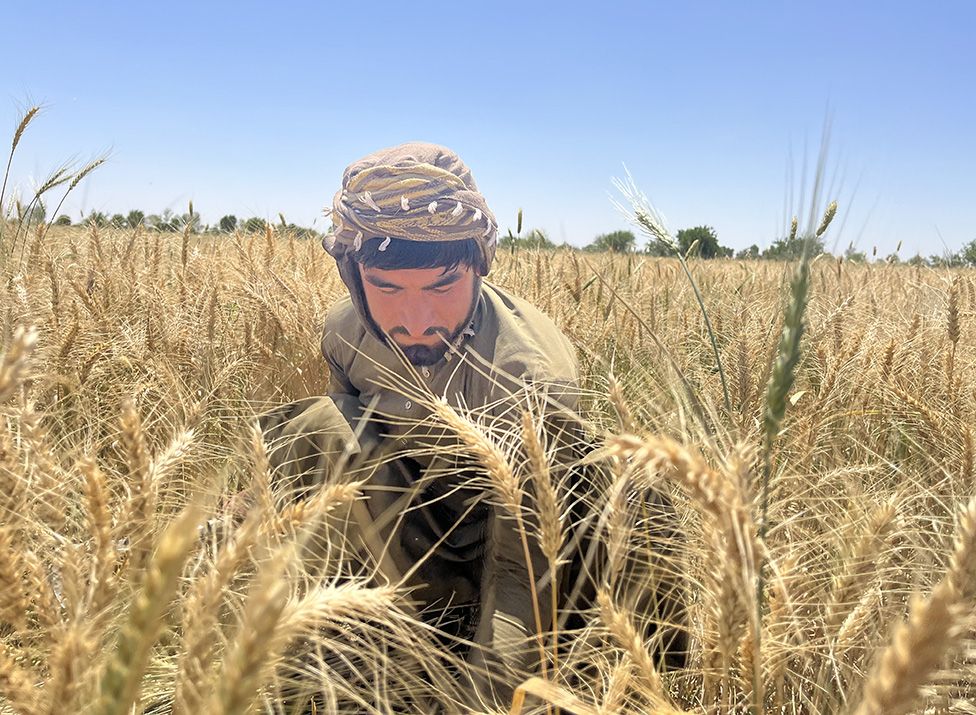 Image caption,
Image caption,Niamatullah harvests the wheat he now grows in place of poppies
We ask Zabiullah Mujahid, the Taliban government's main spokesman, what his government is doing to help people.
"We know that people are very poor and they are suffering. But opium's harm outweighed its benefits. Four million of our people from a population of 37 million were suffering from drug addiction. That is a big number," he says. "As far as alternative sources of livelihood go, we want the international community to help Afghans who are facing losses."
He rejects assertions by the UN, the US and other governments that opium was a major source of income for the Taliban when they were fighting against Western forces and the previous Afghan regime.
How can they expect international organisations to help, when the Taliban government has jeopardised their operations and funding by banning women from working for all NGOs, we ask.
"The international community should not link humanitarian issues with political matters," replies Mujahid. "Opium isn't just harming Afghanistan, the whole world is affected by it. If the world is saved from this big evil then it is only fair that Afghan people receive help in return."
At the source, the impact of the ban on opium prices is already evident. In Kandahar, the spiritual home of the Taliban and traditionally another major poppy-growing area, we meet a farmer who is holding on to a small stash of his harvest from last year - two plastic bags, each about the size of a football, filled with dark, smelly opium resin. We're hiding his identity to protect him.
"Last year just before the ban, I sold a bag like this for a fifth of what I could get now. I'm waiting for the price to increase further so it can sustain my family for longer. Our situation is very bad. I've already taken a loan to buy food and clothes. Of course, I know opium is harmful, but what's the alternative?" he asks.
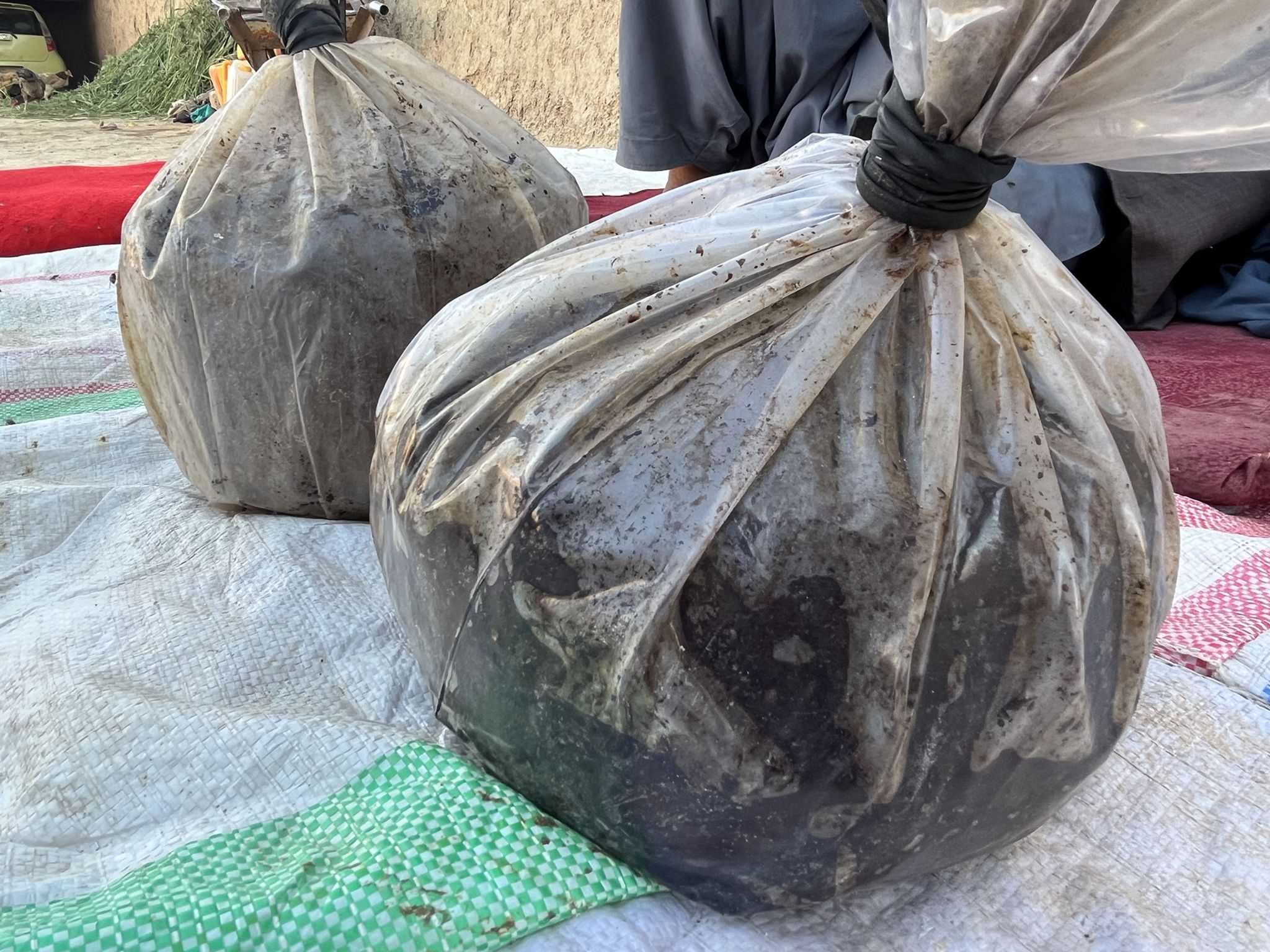 Image caption,
Image caption,Despite the crackdown, a farmer we spoke to still hoped to sell his harvest of opium
It might take a while for the price impact to filter down the chain of illicit drug trafficking to the street price of heroin.
"While opium and heroin prices remain at a 20-year high, they've been falling over the last six months, despite such low levels of poppy cultivation this year," says Mansfield. "This suggests there are significant stocks in the system, and the production and trade in heroin continues. Seizures in neighbouring states and beyond also indicate a shortage of heroin is not imminent."
Mike Trace - a former UNODC official - was a senior UK government drugs policy adviser when the Taliban's first regime banned opium cultivation in 2000, a year before the US-led invasion of Afghanistan.
"That didn't lead to a massive and immediate impact on Western prices and markets, because there is an awful lot of stockpiling by the actors along that drug-trafficking route," he says. "That's the nature of the market and it hasn't fundamentally changed for the last 20 years."
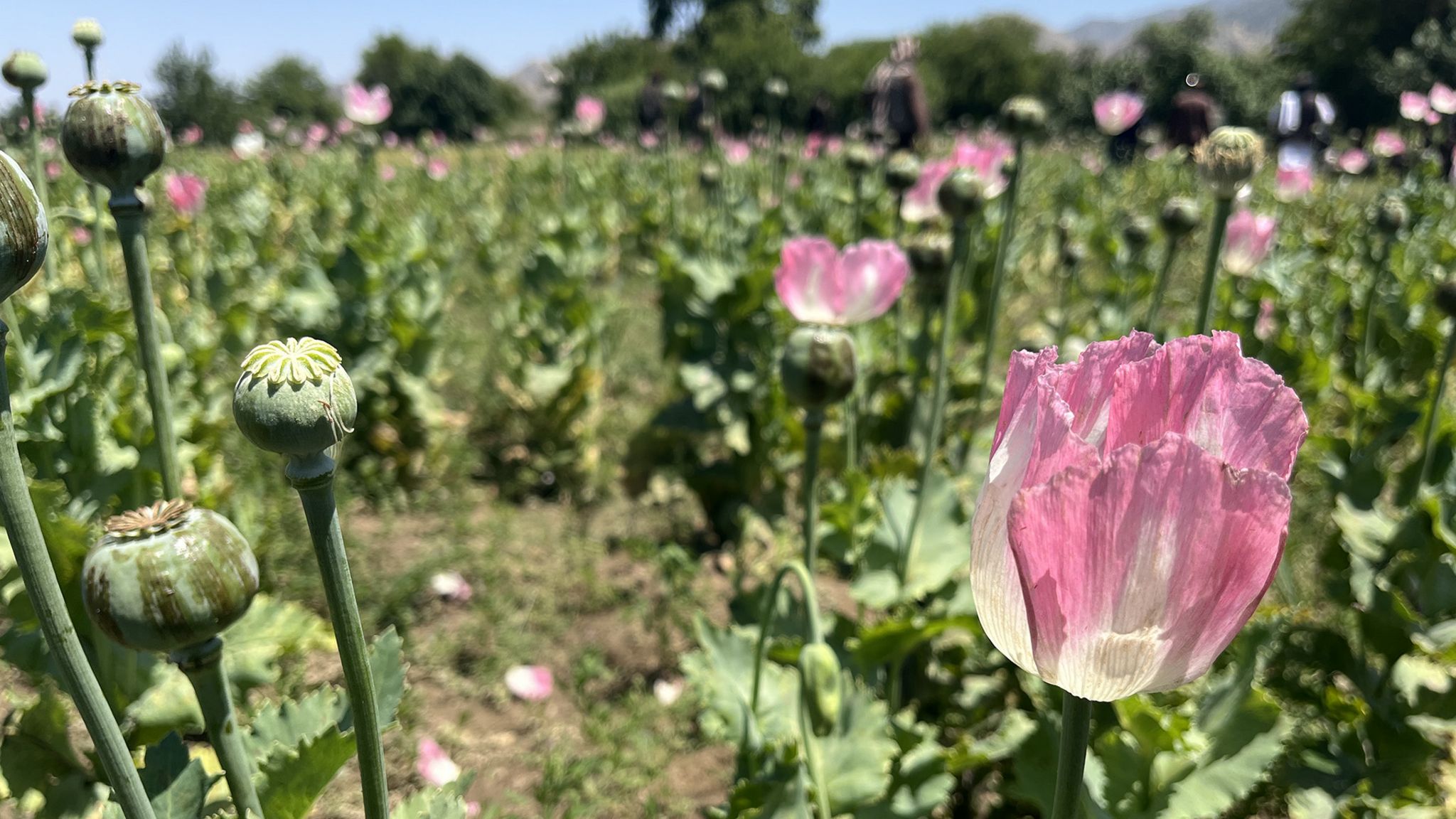
Billions of dollars were spent by the US in Afghanistan to try to eradicate opium production and trafficking, in the hope of cutting the Taliban's source of funding.
They launched airstrikes on poppy fields in Taliban-controlled territory, burnt opium stocks and conducted raids on drug laboratories.
But opium was also grown freely in areas controlled by the US-backed former Afghan regime, something the BBC witnessed prior to the Taliban takeover in 2021.
For now, the Taliban appears to have accomplished in Afghanistan what the West couldn't. But there are questions about how long they can sustain it.
As far as heroin addiction in the UK and the rest of Europe goes, Mike Trace says a dramatic reduction in opium cultivation in Afghanistan is likely to alter the type of narcotics consumed. "People are likely to turn to synthetic drugs which can be far more nasty than opium."
Additional reporting by Imogen Anderson and Rachel Wright
No comments:
Post a Comment